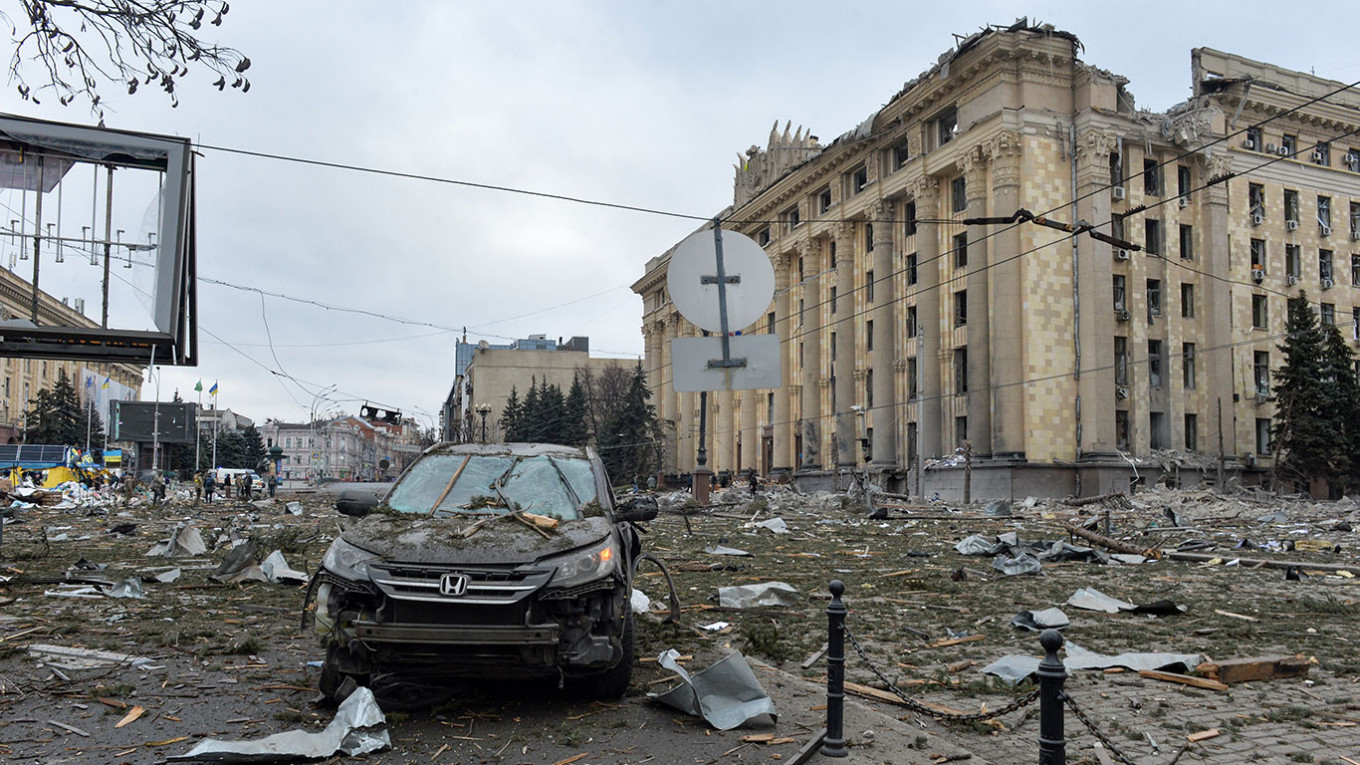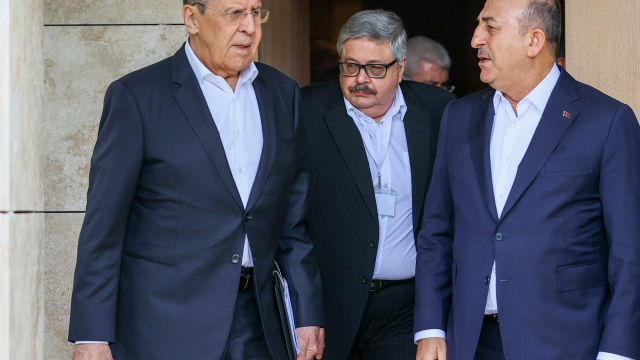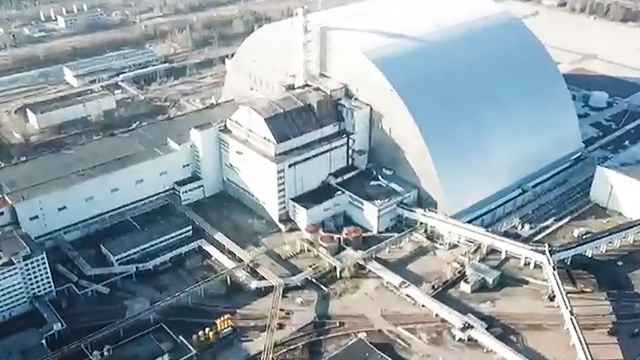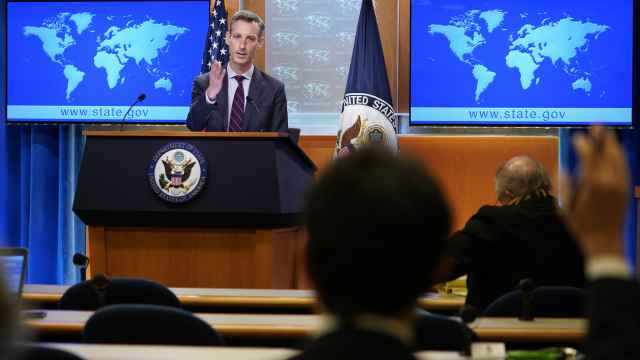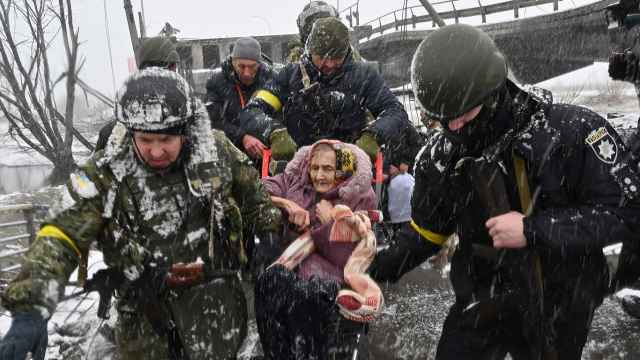Russian air strikes hit a residential block in Kharkiv and the main TV tower in the capital Kyiv, Ukraine said on Tuesday, as Moscow stepped up attacks despite sanctions and warnings of a humanitarian crisis.
Eight people were reported killed in the strike in Kharkiv, Ukraine's second biggest city, on day six of Russia's invasion of its pro-Western neighbour.
Kharkiv officials said 10 more people had been killed by Russian shelling on a local government building, and 10 more were found alive under the rubble.
Ukrainian officials said the strike on the TV tower strike in Kiev killed five people, knocked out some state broadcasting but left the structure intact.
It came after Russia warned Kyiv residents living near security infrastructure to leave their homes.
"This is state terrorism on the part of Russia," said Ukrainian President Volodymyr Zelensky, accusing Moscow of committing a "war crime."
Russia has denied targeting civilian infrastructure.
Visiting Estonia on Tuesday, British Prime Minister Boris Johnson called the bombardment of Kharkiv "absolutely sickening" and reminiscent of massacres of civilians in Sarajevo in the 1990s.
"It has that feel to me of an atrocity committed against a civilian centre," he said.
An AFP reporter in Kharkiv, which is in northeast Ukraine near the Russian border, saw rescue workers carrying a body out of the government building.
The International Criminal Court has already opened a war crimes investigation against Russia and EU foreign policy chief Josep Borrell said the most recent attack "violates the rules of war."
In southern Ukraine, the city of Mariupol on the Azov Sea was left without electricity after bombardment, while Kherson on the Black Sea reported Russian checkpoints encircling the city.
In a key strategic victory for Moscow, Russia's Defense Ministry said its troops had linked up with the forces of pro-Moscow rebels from eastern Ukraine in a region along the Azov Sea coast.
'Shattered peace in Europe'
Russian President Vladimir Putin has "shattered peace in Europe," NATO chief Jens Stoltenberg said during a visit to an airbase in neighboring Poland.
"Russia's aim is clear — mass panic, civilian victims and the destruction of infrastructure. Ukraine is valiantly fighting back," Mykhailo Podolyak, an adviser to Zelenskiy, said on Twitter.
Ukraine says more than 350 civilians, including 14 children, have been killed since the Russian invasion began.
New Delhi said an Indian student was among the victims, killed by shelling in Kharkiv on Tuesday.
More than 660,000 people have already fled abroad, the UN refugee agency said, estimating that a million people are displaced within ex-Soviet Ukraine, which has a population of 44 million.
The UN estimates that 4 million refugees may need help in the coming months and 12 million more will need relief within the country.
Russia has defied international bans, boycotts and sanctions to press ahead with an offensive which it says is aimed at defending Ukraine's Russian speakers and toppling the leadership.
Defense Minister Sergei Shoigu said Russia would continue "until set goals are achieved" after initial ceasefire talks between Moscow and Kyiv failed to secure a breakthrough.
He vowed to "demilitarize and de-Nazify" Ukraine and protect Russia from a "military threat created by Western countries."
Western powers are planning more sanctions in response.
Former Russian president Dmitry Medvedev, the deputy head of Russia's Security Council, hit back saying "don't forget that in human history, economic wars quite often turned into real ones."
'Bombing kept us up all night'
Russia on Tuesday urged Kyiv residents living near infrastructure linked to Ukrainian intelligence to evacuate and fears are growing of an all-out assault to capture Kyiv — a city of 2.8 million people.
Satellite images provided by U.S. firm Mazar showed a 65-kilometer (40-mile) long build-up of armored vehicles and artillery north of the city.
Zelenskiy said defending the city was now "the key priority for the state."
Inside Kyiv, makeshift barricades dotted the streets and residents formed long queues outside the few shops that remained open to buy basic essentials.
In the village of Shaika near Kyiv, Natasha, 51, opened a canteen in the local church to feed soldiers and volunteers.
"The shelling and the bombing kept us up all night," she said.
Neighboring Poland has taken in nearly 400,000 people.
Iryna Plakhuta, a pregnant 43-year-old executive, had to leave her family behind in the capital because of fears over her safety.
"Our husbands stayed in Kyiv," she said. "They are protecting Ukraine. It's so hard."
The UN launched an emergency appeal for $1.7 billion (1.5 billion euros) and EU chief Ursula von der Leyen pledged 500 million euros.
"The destiny of Ukraine is at stake, but our own fate also lies in the balance," she told the European Parliament.
Sanctions hit Russians
Western nations have moved to increasingly isolate Russia, responding with an intensifying diplomatic, economic, cultural and sporting backlash.
U.S. Secretary of State Antony Blinken on Tuesday suggested Russia should be stripped of UN rights council membership, further squeezing the diplomatic noose.
Germany has already promised arms for Ukraine, while the EU also said it would buy and supply arms to Ukraine, the first such move in its history.
And Turkey said it would implement an international treaty to limit ships passing through the Dardanelles and Bosphorus straits, a move requested by Ukraine to block the transit of Russian warships.
Within Russia, sanctions imposed by the West have begun to bite.
Putin announced emergency measures intended to prop up the Russian ruble, including banning Russians from transferring money abroad, after the currency crashed to a record low.
Prime Minister Mikhail Mishustin said Moscow was also preparing a presidential decree to prevent foreign investment exiting the country.
Many ordinary Russians raced to withdraw cash.
Retired soldier Edward Sysoyev, 51, fidgeted impatiently while in line at a bank in Moscow.
"It'll be ordinary people who pay for this military bun-fight," he said.
Russian conductor sacked
The response from the world of sports also gathered steam, as Russia was expelled from the World Cup and the country's clubs and national teams were suspended from all international football competitions.
The International Olympic Committee on Monday urged sports federations and organizers to exclude Russian and Belarusian athletes and officials from international events.
And Russia was stripped of hosting the 2022 Volleyball World Championships, while YouTube said it was blocking Russian channels RT and Sputnik in Europe and shipping giant Maersk said it would stop deliveries to Russian ports.
In the arts, the Munich Philharmonic said it was parting ways with star Russian conductor Valery Gergiev "with immediate effect" after he failed to respond to a request to denounce the invasion.
A Message from The Moscow Times:
Dear readers,
We are facing unprecedented challenges. Russia's Prosecutor General's Office has designated The Moscow Times as an "undesirable" organization, criminalizing our work and putting our staff at risk of prosecution. This follows our earlier unjust labeling as a "foreign agent."
These actions are direct attempts to silence independent journalism in Russia. The authorities claim our work "discredits the decisions of the Russian leadership." We see things differently: we strive to provide accurate, unbiased reporting on Russia.
We, the journalists of The Moscow Times, refuse to be silenced. But to continue our work, we need your help.
Your support, no matter how small, makes a world of difference. If you can, please support us monthly starting from just $2. It's quick to set up, and every contribution makes a significant impact.
By supporting The Moscow Times, you're defending open, independent journalism in the face of repression. Thank you for standing with us.
Remind me later.


